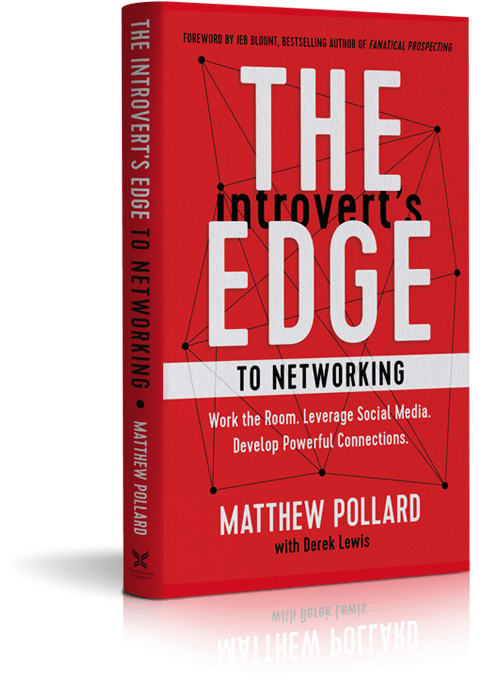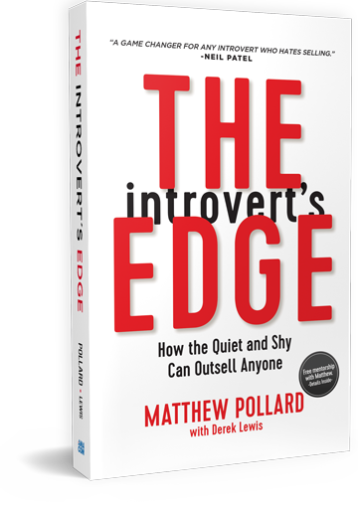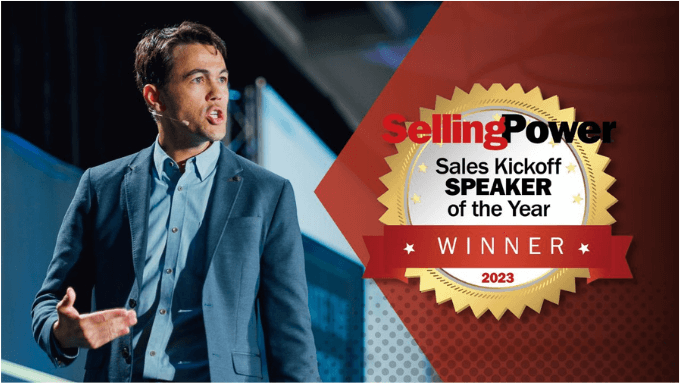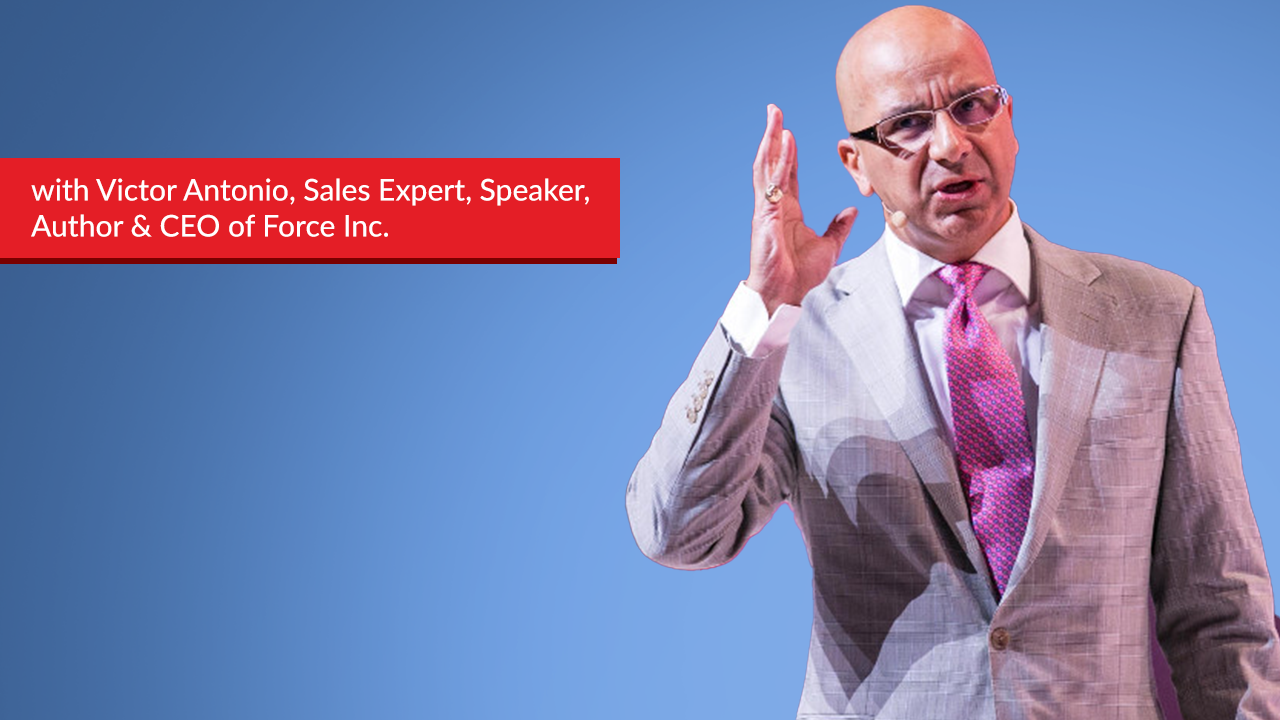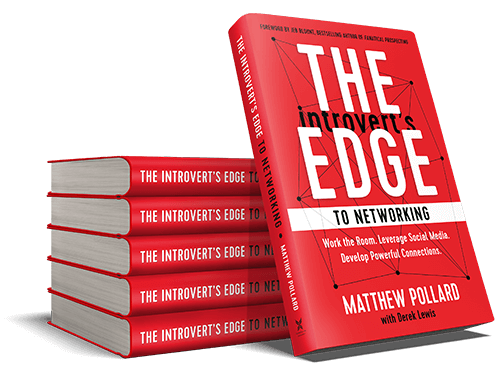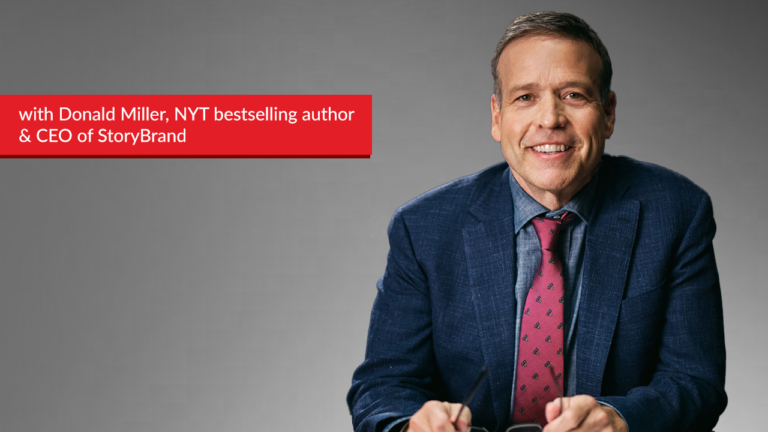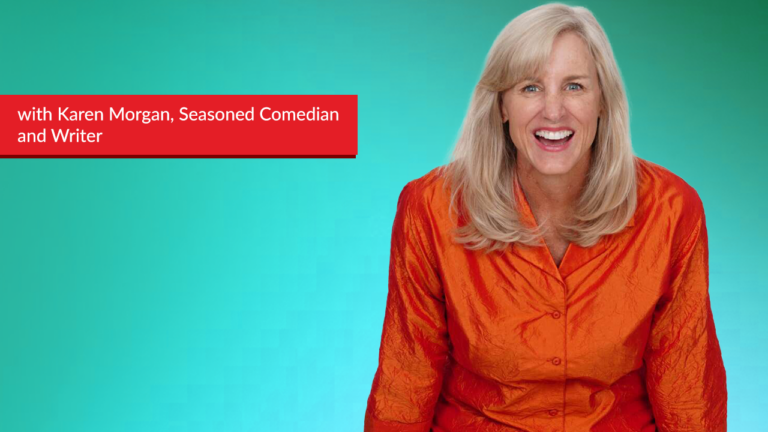Matthew Pollard: Hello, everyone, and welcome to the Introverts Edge podcast. And I have to say, this interview is actually starting about an hour after the date. The time it was supposed to stop is Victor. Antonio and I have been talking about sales, about introversion, about AI. My gosh, these things we’ve talked about, we should have pressed record earlier. However, today I am ecstatic to introduce my good friend Victor Antonio.
And I, you know, he’s a guy that I mean, he’s got an engineering background. And as you know, most engineers are so, so logical in nature. But then he ended up the VP of sales for a Fortune 500 company after, you know, relatively humble upbringing in Chicago. He ends up there and now he’s actually shared the stage with another amazing introvert, Zig Ziglar, which is a privilege that I wish that I had had.
So this guy’s got an amazing history. He is an introvert, and he’s here to talk to you about how you can sell as an introvert, which, as you know, is one of my favorite topics. Victor, welcome to the show, mate. I’m ecstatic to have you.
Victor Antonio: Matthew Thank you for having me. This was overdue, man. This was overdue.
Matthew Pollard: Wasn’t it? Might I have to say so for these people, for those people that haven’t seen this, I actually I was on I was on the show a while back and he literally interviewed me in a hoodie because he wanted to connect that from a story that I have in my book about the fact that when I finish speaking on stage, I kind of go I go back to the hotel room or I go home and I put on a hoodie and I, I just watch watch Netflix.
And, you know, he was really trying to find there’s nothing wrong with that. And I think that’s a really important thing for us as introverts, is that we need to understand that we have strengths, we have weaknesses, we have skills gaps, really rather than weaknesses. And we need to lean into who we are. And that’s okay. And I think one of the things that I love about Victor’s message is really that it’s he he helps people believe in themselves and know that being yourself is okay.
As a matter of fact, usually that’s the best version of you being exceptional. But when you see Victor speak and I have to admit, like I have seen him, clips of him speaking from stage and this guy looks like the most outspoken extrovert on the planet. And so as you experience this interview, you’re going to have trouble believing that he’s an introvert.
So let’s let’s break that first down. And and, Victor, firstly, help us understand like, did you always know you were an introvert? We were much quieter when you started to grow up. Like, how did you become like the guy that you depict from the early era to the guys that, you know, is now being asked by the National Speakers Association to speak at the national Convention?
Victor Antonio: Yeah, well, it’s funny because people who knew me, let’s say in elementary school or high school, look at me now. Go. What happened? Like Lily, What happened? Because I was that quiet kid that was always very insecure. I’m the youngest of seven, and so I was always like the skinny kid. Do you know what I mean? I’m not the strongest, not the fastest.
Couldn’t jump that high. Had all kinds of what I call physical disabilities, if you know what I mean. And not great at sports. I was okay at sports. So in a lot of things, I was not good at doing things. I was good. I was probably watching movies at home. So I would always like, you know, just I was always wanting to stay home and not go anywhere like my mother.
You know, we come from Puerto Rican family, Puerto Rican families. We love to celebrate. You know, whatever. There’s an excuse for a party. We’re there. And I remember I never really liked that. I always felt insecure. You know, my cousins always seemed to have their act together. Everybody always seemed to have more than me. And so I was always a quiet kid in the corner.
I would hide behind my mother and my father’s legs, you know, when people wanted to say hi to me. And so fast forward, I go to high school, same thing, you know, always that insecurity. I mean, I guess in high school we’re all somewhat insecure, But I think I had a little more of it and something happened, I think, in college.
I think, you know, I started becoming more a little more outspoken but still kind of, you know, reserved. And if people ask me, well, what happened? Like what was the inflection point? And I really don’t know. I got to be honest. I know that if I can fast forward a story even further, someone my first corporate job after college, I had to learn how to speak because I had to do presentations.
Even though I was on the engineering side, I had to do product presentations. So I joined Toastmasters. And I think Toastmasters is where, you know, speaking organization where you learn how to speak. I think that’s when I started coming out of my shell a little bit.
Matthew Pollard: Okay, that’s interesting. And one of the things that, that I know about you and you know, we were talking about it just before the interview started, but you are very, very regimented. And one might say like a little bit hyper focused on understanding a specific topic. I think a lot of people know a little bit about a lot of things.
You do that as well, but you gravitate on specific topics and I think I’m projecting here. So I want you to tell me if I’m totally wrong and off base that is totally fine. But your engineering background, I found a lot of people that that I’ve worked with in sales engineers tend to gravitate to methodology or following methodical process a lot.
And I’m wondering whether Toastmasters is you learned specific techniques and strategies, learned how to do things in specific orders, and perhaps that’s something that you do in sales as well. Is it that I apply system to what most people think is kind of just winging things that makes you comfortable? Or was there something else in that success formula that I’m not saying I was?
Victor Antonio: You know, the thing is, when I was young, right, the I get lost in movies, like that’s my addiction, man. I love movies, especially like the old movies. Right. And so it’s an imagination thing, right? Your mind just runs away with it. And so when I decided to become an engineer, I did it because, you know, we were poor, we didn’t have a lot of money.
And I asked my teacher, You know, what makes a lot of money? So being an engineer, I’m like, All right, I’ll be an engineer. And then I picked electrical engineer because sound familiar? So I did it for all the wrong reasons. Right? And so. So imagine is this what I call this creative being? Because, you know, I played music, I joined band because to me, band is like, you’re part of something, but you don’t have to be part of something.
So I’ve always loved music. I played bass guitar, played trombone in the school band. So it’s always this creative, you know, always daydreaming type of guy. Again, I think a lot of introverts are like that, right? You just kind of go into your own head, you know? And so when I became an engineer, now I started learning about systems and processes, right?
And so I’m that weird hybrid, you know, I can be creative but still want process. In other words, to reduce my anxiety, I have to have a process. And so I think that’s played to my advantage. I can create a process, but within that process, there’s still that creative playing that goes on, like in your mind to kind of make, you know, let’s say a presentation better.
So presentation to me, I look at it as a process and then I just make it better by creating these innovative little things to kind of entertain myself. So I’m that I don’t know if I’ve answered your question, but there’s that blend of mind because I’m never I’m not hardcore got to follow the system, but I really love the creative piece of doing something because I think that’s where my brain goes all the time.
Matthew Pollard: No, I think that’s really helpful because what I’m hearing is that you’ve perhaps feel more comfortable to be creative in the boundaries of a process because you do it.
Victor Antonio: Thank you for saying that so succinctly.
Matthew Pollard: Okay. Well, great. I’m glad that I got it right, because I think that’s really interesting because a lot of people see processes in this rigid thing that you can’t you can’t deviate from. And especially for small business owners that are thinking about being more authentic in specific specific areas. You know, when I teach storytelling, for instance, I tell people that, you know, you need to tell the story the same way all the time so you can practice.
But I’m creating that rigid process to the storytelling. But I’ve actively listened before the I tell the story and I’m attaching things that they’ve said creatively to to the story to make it more relevant to them. And I think a lot of people think it’s rigid or winging it. There’s none of this blending between the two. And I think what you’re kind of highlighting is your key to success is actually being able to lean into that creativity because you’re not scared to do that, because you’ve got this process and this structure that keeps you safe within it.
And I think that’s perfect. That’s that’s amazing. What I’m interested in, though, because, you know, I’m forever telling people that, like, every process is not created equal. And don’t get me wrong, I’m not I’m not trying to convince people to check out my process or your process. I’m saying that a lot of times firstly, I drives me nuts when people think that sales is like mixed martial arts, like let’s grab the best bits out of every process and stick it together and see what see if it works, because that’s just an explosion, right?
You’ve got to pick a process. But what I find is that a lot of people will say, well, okay, if I’m picking a process, you know, I need to go with once, you know, the more common kind of techniques that are more bull doggy the hard closes. And even if it doesn’t make me feel comfortable, I’ve got to push through that discomfort.
And I’ve always said, well, no, no, I like to to lean into what makes me comfortable and authentic, and that leads to higher success. But what I love it, you know, I mean, you literally written the book on the fact that these techniques that people think they should do to get success in the world, that the extroverts, perhaps like the introverts, don’t don’t even work that well.
And there’s a bunch of research around that. So for these introverts that are like, I have to learn these kind of extroverted behavior isms, help help people understand that that’s actually not the answer to success.
Victor Antonio: I can’t do that. You know, it’s again, I think it’s my introverted nature that says I can’t be the pit bull, you know, the bull dog, you know, bite him on the leg. Don’t let go. I can’t do it. I just can’t do it. And I love the fact that you keep using the phrase. You got to lean into that, right?
You got to lean into your strength. And my strength was never being a pit bull. And I learned this years ago. There was a guy name we may have talked about this on my podcast. His name was David, and David was like, if you look at him, you know, you know, the Where’s Waldo thing.
Matthew Pollard: Yes, absolutely.
Victor Antonio: And Waldo, well, he looks like Where’s Waldo without the hat, right? Actually looks like like I’m not kidding. The glasses the whole bit. Right. And every year this guy was always in the top three quiet, unassuming introvert. Right. Killing it every year. I’m like, what is it? And so I became his manager at one time. And I remember we went to to visit a customer and and David walks out of the room and I said, I got to ask you a question.
This is a personal question. I got. I knew him one enough to ask this question. I said, What is it about this guy that you love so much? Because they were like, you know, we love them, don’t change them, you know, because I was going to change the structure. The company says, No, we want him. And he said something to the effect.
I said, You know, Victor, he never comes in here to sell anything. He comes in here to share what he’s got, what we’ve what you’ve developed as a company. And he just tells us, what can I do to enable you to look at these? Maybe, you know, take a peek at him where he never hard closed them and they love that.
And I think you fast forward I mean, this is a while back, but you fast forward today. Nobody wants to be pressured into buying something. The customer is more informed than ever. So, you know, I think the true differentiator today in the market is everybody has pretty much we’ve reached product parity, service parity. Everybody has the same thing.
The salesperson to me is now the ultimate differentiator in the market. And what I’ve learned is that people don’t want to be pushed into buying something. They need help in making a buying decision because they’re overwhelmed by the choices. And so if you’re an introvert listening to this, here’s the here’s the key, here’s the secret to selling. Be so good at understanding your domain space that when someone comes to you for advice or looks to you for advice, be that Sherpa, be that guide that can help them clarify the issues and reduce their anxiety and, as I say, increase their certainty.
And that’s what they’re looking for. So I don’t think you have to be pit bull. I don’t think it works. Look, if you’re doing transactional sales, if you’re selling a, I don’t know, timeshare high pressure situations like that, that’s what you want to do. Go do that. That’s not me. The rest of the market, let’s say 95%, is all about how do I help you make a buying decision?
Matthew Pollard: Look, I love that. And I think that people have kind of forgotten the original definition of the word sales. I mean, I mean, it was derived from the Scandinavian term to serve. And I, I think a lot of customers, if they’re going through a buying decision, it’s because they want an outcome or they have a problem. And if and this comes with the duty of care, right.
If people are selling a product, don’t believing that doesn’t work. Go find another product or another service to sell. I mean, with unemployment being what it is, right? You don’t need this job like sell something that’s meaningful to you. But for those people that are selling something that they believe that can truly help their customers, the best way to serve your clients is to get them out of their own way.
Victor Antonio: Now they go well.
Matthew Pollard: So I think that for most people, though, they feel like they’re trying to do that. Victor I think that a lot of people feel like they’re educating their customers and then all of a sudden all these objections come out and introverts specifically, they get really uncomfortable with those objections. And I know that you kind of you you speak a lot on like the common objections people receive and how to get them out earlier so that you’re not being slapped in the face with them later.
Like, if is an introvert that’s listening to this and I would assume every introvert that’s in sales is listening to this going, Oh my God, I hate objections. And I’ve been this where I’ve been the educator and I know we could probably talk about why education is not the right fit either way. We have there’s a there’s a salesmanship to that.
But if we would to say, let’s assume for a second that if there was one thing you could do that allow you to be successful, it’s to not get hit with that objection at the end, especially with the way most introverts react to that. How would you recommend the average? Well, firstly, what are like the most common objections that you generally find and then how do we bring them into the conversation sooner?
So that I think, to use your words from your book, you know, to get them to fixate on that one Objection. So you know what you’re dealing with.
Victor Antonio: Yeah, the show I wrote a program and I’ve got a video course, by the way, a good seminar on YouTube for free. Just type in blocking objections. Victor Antonio And so in there I talk about the science behind why raise an objection before the client does is actually more powerful. So if you hate objections, which I do, what I do is I sit down with companies, I’ll sit down with anybody and say, okay, give me your 3 to 5 objections you typically get.
And the most people have been able to come up with a seven, but that’s really pushing it. Typically there’s 3 to 5 objections you always get. And so then I’ll take those 3 to 5 objections. And in this blocking objections course, I teach you how to raise the objection so you can control the objection and then how to tie down the objection.
This is a perfect tool for introverts, because if you block the objections throughout your presentation, by the time you get to the end, you’ll feel that resistance lowered because you’ve already raised the issues. Let me say it another way. If you’re ready to buy a product and the salesperson keeps raising every objection you have in your head, then all of a sudden there’s not going to be that many objections by the time you get to the end, if any.
And so all you got to do is do that. So if you’re if you hate objections, block them by inserting them and then tying them down during the presentation. And by the way, this is where my engineering brain kicks in. What I do, Matthew, is if I have a 45 minute presentation, I then sequence where I’m going to highlight these objections and raise them and have them baked into my presentation and I’m telling you, you will feel the resistance go down as you do it.
Matthew Pollard: Wow, that’s really interesting. And for those people that are listening, how do I get access to that training? We’ll put a link in the show notes, show notes so you can go directly to that. And you know that That was a wonderful gift. And thank you for sharing that video. I think that for introverts, that’s probably the training they need to watch straight away.
So don’t binge listen to my podcast. Just go straight to YouTube. Listen to that. There’s a reason why this guy has over 200,000 subscribers. So what I what I really want to to help people understand. Okay, So we’ve methodically bought these objections further forward. But I mean, I’m going to I’m going to lean into the characteristic engineer background, which I don’t know, characteristic engineer, but what generally high functional service providers will do, people that have really complex products also do is they tend to feel like it’s their job to educate their customer on the 30 years of experience that they’ve got so that the customer is in a better place to it to make an informed decision. And to the average person, they feel like they’re helping that client. But to the person that’s receiving that information, it kind of feels like they’re getting hit with a firehose of information. Yeah. What do you find the best ways? I mean, you know that I’m a big supporter. I’m using story to sidestep that problem. Are you a storytelling guy as well, or do you tend to have other methodology for people that want to be more practical about the information that they provide in the way they provide it?
Victor Antonio: The I use the pest control industry as an example. Let me just start there. I know it seems random, but there’s a reason for it. If you call somebody over to your house because I don’t know, you went to the attic or your child’s room, and in that corner there was an infestation, right? Boom, There’s the infestation. Now imagine the actual pest control person getting there and talking to you about everything but that infestation in the corner.
Right? That’s what you want to talk about. And I think a lot of companies are having problems today, that they have specific issues they want resolved. So this is why the discovery process is probably, you know, the most important part, not probably is the most important part. If you’re an introvert, take your time to ask great questions. I believe that the average salesperson practices what they say the best salespeople, the superior salesperson practices what to ask.
So if I do a good discovery, that means I know what your issues are. So when I move into my I’ll call it the education or presentation phase, I know exactly where I’m going to start. I’m going to go straight to that corner where the infestations are. In this case, you may be losing revenues here. Let me start with how I can help you here and then expand from there.
So that’s the first concept, is that if I do a good discovery, I know where your pain points are. And then in my presentation I go immediately to those. Now I always say part two is that you got to be careful. And given that it’s a complex sales cycle, you can have multiple times to present. But what I’m presenting for the first time, I use the rock skipping analogy.
In fact, I use a rock skipping analogy in my presentations, and that is when you’re talking about somebody, let’s say in the first phase, it’s an introduction. You want to remember how we always skipped rocks. You try to get how many skips in there. When you’re skipping the rock, that means the conversation is flowing. When the rock turns in, it’s sinks.
That means you started educating and you can feel the momentum of that conversation. Slow down. So two ways to handle a presentation. One Handle your specific needs specifically. First, could you tell me what they are if I don’t know, then what I will do. If you say, Victor, just give me a general presentation, then I skip rocks and I’ll as I’m skipping rocks, I’ll look for indications that, Yeah, you know what that right there seems to resonate with you.
Matthew Pollard: I think that’s great advice. And I think for the average introvert, they you’re 100% right. They’re questioning process is so vitally important because I think they think well, I need to ask I need to ask these questions and then they they ask those same questions all the time. They’re not methodical about thinking about this person situation. Like if they got notes about what this person was looking for, why they booked the call, or what industry this person’s in.
And I mean, I see it so often where I role play with somebody that’s doing sales and doing, you know, just a sales role play, and they’ll ask me a question and I’m like, just stop for a second. Why are you asking that question? What does it even matter? You could research that online before you even got on the call or like, what does this actually matter to the problem that I have?
I’ve got an infant station over here. Why are you asking me if I’ve got air conditioning? Like, it’s cool, this question and you may think you’re developing rapport, but there are questions you can ask that develop rapport and also have a meaningful impact to the sale. And I, I think that and actually, you know what? I want to talk about this.
So just so everybody knows, Victor Antonio is also going to be on our introverted seller Summit. Now, for people that are hearing about this for the first time, we are doing that on the 11th of September. You can go to the introverted seller Summit dot com and Victor will be on that as well. He’s going to be talking about I we’re going to be we’re going to be talking about chocolate bars which is going to seem like a completely weird topic, maybe even more.
We have been exterminated, but we’re going to be talking about that. And you know what I what I really want to also kind of really understand is what methodical questions to answer and then how to what question to ask and then how to build that into a presentation. So if you haven’t registered for that yet, make sure that you do.
Again, that’s the introverted seller summit dot com. And look there’s going to be 20 other amazing introvert dad sales coaches obviously Victor’s phenomenal. I’m going to do my best to keep up with his level of adrenalin and energy in my presentation, but I actually want to change gears just for a second because you and I see eye to eye on a lot of things.
And I think one of the it’s got nothing to do with sales, but I think one of the most important things that we see eye to eye on is defining what success looks like. I think people always focus on I want to be successful, I want to be successful. And I think it was Jim Carrey that kind of said, you know, I wish everybody got the opportunity to be truly rich just once to realize how unimportant that was and to really define what success is.
A matter of fact, like you and I were just talking about what, you know, making meaningful change, what that looks like and why it’s about really being open to discovery. But I think that a lot of people listening, and especially the small business owners that are kind of in that scarcity mentality, like I need a customer, any customer will do and I need money.
So talking about passion and mission, forget that for that out the door, even though passion, that mission perhaps is the reason why they should be getting sales then not talking about it. And I think what you’re really good at is kind of helping people realize what success looks like, what’s the rubric and how to define that in your own life.
And, you know, I know that this is a complete curveball from the world of sales. I just feel like it would be really meaningful for people to hear you speak on on success If you’re open to sharing any value on that topic.
Victor Antonio: I think the the the line that’s just ringing in my head is comparison is the thief of the joy, you know, because it’s like as soon as you stop comparing yourself to other people or looking at what other people’s people have or looking at other people’s pockets or inside their pockets by that, look at how much money they make.
I think the happier you’ll get. So I’ll rewind the story. I just I quit. Corporate America May nine, 2001 3:48 p.m.. I make the call. I quit. I want to do my own thing. I was very specific on time and I remember six months into this thing, I’m not making a lot of money, but I wanted to be a speaker.
I’m not making a lot of money. Then I go back to that. Seven Habits of Highly Effective People. Remember that thing about what can you control the circle of influence? There’s things you can’t control that there’s things you can’t. And I said, What can I control? That’s a great starting point for any introvert. Start there. What can I control?
And I said, Why can’t control who books me? I can’t control who pays me. I can’t control the market. What can I control? I can control how I speak. And I was doing your standard, you know, Toastmasters. Tell them what you’re going to tell them. Tell them and and tell them what you just told them. And I said, That’s not how I do it.
I don’t want to do it that way. I want to do it my way, you know, the Victor style. And then I started doing it my way. And when I started doing my way, Matthew, it’s like everything began to change. First of all, I was now enjoying my presentations because I was doing it my way. Now that I know that my way was the right way.
No, but you know what I realized? It’s the only way I can only be me. When you’re you, it’s the path of least resistance. I have this saying that said, the toughest road to success is the road back to you. Let me repeat that. The toughest road to success is the road back to you. In other words, unless you can be the authentic you, which I know you hate thinking about you introverts, you’re only going to be happy when you get back to that person and you do things your way.
And I’ve had people criticized by speaking style how you know, early on, you know, why do you do that? Why do you say like this? Why do you do this? And I’m like, shut up, I’m doing me. And I think you’ve got to have the courage to do that. So to me, success is about doing it your way.
I’ll have Frank Sinatra, and as soon as you realize that you just when you don’t compare yourself to other people, like I can look at you, Matthew, and you know, you could be earning 520, 30 times more than me. Don’t care. I will say God bless you, Keep doing your thing, because that’s you. That’s not for me. Here’s how I want to do it.
And as soon as you said, you lean into that, this is who I am. And I love the phrase you keep using Lean in to who you are. The sooner you do that, the quicker you’ll find happiness and success.
Matthew Pollard: I think that’s powerful. And I have to say that I do my best to do that every chance I get. But I still trip up from time to time, and especially when you do something new and, you know, I remember when I first moved into speaking, I kept trying to copy other people. And then I also felt like I always feel like unless I’m serving and listen telling stories, I don’t feel like I’m connecting and I don’t feel like I’m making meaningful change, which makes me feel inauthentic.
And of course, the first time I spoke, the thing I started with was my my own personal journey. I was giving my resume because I felt like they needed to understand why they should take this kid who’s getting on stage seriously. And it was actually Tom Singer, who’s great friend of mine. He said, he said, Matt, I heard your whole presentation.
And I have to say like, you’ve got experience. I mean, the level of the business you should credit, all of that was amazing. But I got tired of hearing the word I by 10 minutes into your presentation, I was over you. I didn’t care what you said at that point. Like, I know you’re a good guy, but I actually hated you.
I didn’t use those words, but that’s what I heard. But he said it in a much more pleasant way. That’s what I heard. But what happened is he then said, like, if you grabbed your personal story and put it, you had two other stories. Grab those, put them upfront, then humble yourself and, you know, talk about your personal journey there as a where I came from rather than why you need to listen to me, it’ll have a much more meaningful impact.
And that was so much more me too. And I’m like, How idiot, How is it that I didn’t occur to me? And what it was was when we aren’t when we don’t have a level of self-efficacy. I’m speaking from my point of view when I don’t have enough self-efficacy, I go to what I think sometimes and sometimes, you know, self-confidence.
Being trying something new can allow you to hit negative potholes that aren’t leading to success, but they’re also not leading to you. So what was the point? And what I what I’ve learned now and I think you’re a master, this, Victor, is you go to what is best practice and then you say, let me try that on. I’m not comfortable with the way that would work bringing it back to me.
And actually, I don’t wanna put words in your mouth because I’m about to ask you what your instruments ages, and I think I just figured it out. But I think that for me, I think that what you’ve what you’ve done, I’m not sure if it’s coming from a place of humbleness or whether it’s coming from a place of I need to understand it so I can make a value weighted decision or an informed decision on whether I’m going to change the process to come closer to me, like that process that you go through to to get back to you.
You seem to naturally get back there quicker than Will than I do and perhaps many of the people listening. Do you have a rule set a toolbox or is it that renegade nature that we all know you have that kind of forces you to go? Well, I need to understand it enough to know how to get away from it.
They kind of get you.
Victor Antonio: They know. I think it’s a process. I think for me, it was a process to I’m a few years older than you, so, you know, it took me a few years just to kind of figure this out, that I got to stop comparing. But you can say that logically, but it isn’t really hits bottom emotionally that you go, Oh, I get it now.
And it’s hit bottom with me like logic. Like, okay, I need to stop comparing myself. I need to stop trying to be other people. We logically say that to ourselves, but but it is until you come to peace with it, you know, I mean, you find peace within that zone and I can’t take that something you can’t teach.
Each individual introvert has to go through that journey of like, you know, okay, I’m here finally, and then you’ll feel this sadness kick in. Like, I’ve been living in the zone for the last 5 to 7 years. I’ve been in the zone by zone. I mean multiple. Well, he’s making a lot of money. No, you’re missing the point.
It’s that place where you’re happy with who you are, where you are, and nothing can mess with your equilibrium. And I feel so blessed to be in that space. But man, it took a lot to get there.
Matthew Pollard: I think that’s a great place to finish this interview because I feel that what you’re really highlighting is that success isn’t becoming someone else. It’s actually coming back to who you are. And I think that that is absolutely aligned with what I believe that every introvert should do, and that is not see themselves as second class citizen. That needs to change, but to be their authentic self and learn the skills and strategies that they need to do that in all of those so-called extroverted arenas.
If indeed those extroverted arenas are places that they need or want to be part of. And so for those people that are enjoying this interview, again, I really want to direct you to the introverted Cell Summit. I know that Victor is going to just provide a ton more valuable information there as well. But, you know, I would love to finish off with just firstly for you to share what you think you’re introverts edges and then also where if people feel like, oh my gosh, this is the guy that I just need to just consume all of his information, where would you suggest I do that.
Victor Antonio: The so go to Victor Antonio dot com That’s easy answer you’ll find me the so here’s my introverts edge like truly by a trigger attach. I don’t like every time I speak in front of a large crowd I have to practice quite a bit. And so so when I get on stage it’s very natural. So one of the things I do is obviously I structure presentation like this one I just did for an essay, right?
I structured the presentation for about a month. Like literally I take walks every day for about an hour and I and I flick through the slides in my head. And if I don’t remember why, I got to go back, you know, next day and do it all over again till I get all the slides in my head and then I just mimic everything I have to say.
So sometimes you just saw me walk it. Matthew This is what it looks like if you’re watching this and if you listen, there’s a wave in my hands and people are like, What is he doing? I walk around the house mimicking gestures I have to do when I’m going through the slides in my head. And so one thing I do is I memorize my slides so I don’t have to look back at the slides.
I know what’s there. Then I know what I’m going to say, how I’m going to say, what gestures I’ll use. So by the time I hit the stage, it’s just so natural that people go, Oh my God, you’re so good at this. And I’m like, Yeah, you haven’t seen the work that went into just building this one presentation.
So that confidence is what makes me that’s my introverts edge right there. I overcome that because I have so much confidence I can delivered by the time I get up there. I’ve delivered it for 100th time now, one on one, right? And so if you’re struggling to present, you know, again in your house, quietly walk around the house doing your gestures, My wife just ignores me.
Now she knows what’s going on when I’m practicing. And so just have that down so much so that when you do the presentation, you’re not thinking about it. You’re actually in the conversation cause you’re not thinking about your presentation.
Matthew Pollard: That’s really powerful. And I, I think that introverts a lot of times feel like they may have spent five years developing their quality qualification, another ten years getting better at the skill of delivering the service or product that they have, and and then they win sales or they win. Speaking from stage about their product and the same level of detail and planning preparation, that’s what you’re hearing.
You’ve got to be doing that. And you know, for someone like Victor who shares a lot of the same awards, I easy on the global guru’s top 30 list of sales professionals he’s a selling power magazine top 20 speaker in the world he’s hit all of those milestones that most people here are capable of achieving. What’s limiting you is mindset, belief system and all of that comes from preparation.
I love to say that all of that doesn’t, you know, is something that you just, you know, take a pill and miraculously have it. It doesn’t, but it does come from preparation and a lot of times the best sports stars like Michael Jordan was not the first person to become successful. He was just the one that everyone remembers.
And that’s what I want for everybody listening today is to become the person that they truly are, a successful person. That becomes that comes with planning and preparation. But for today, thank you so much to everyone for joining us. If you’re enjoying this episode again, check out the introverted seller Summit and make sure you check a whole bunch of the back episodes of the Introverts Edge podcast you might specifically enjoy.
Jay Papasan’s interview, which is going to I mean, he spoke in front of 20,000 people. He got told about it the night before, and you can hear about his blackout and how much preparation he put in to succeeding at the next one. And now he loves speaking from stage. And another thing I want for everyone listening. So thank you for joining us and we look forward to seeing you in the next one.
Cheers, everyone.







